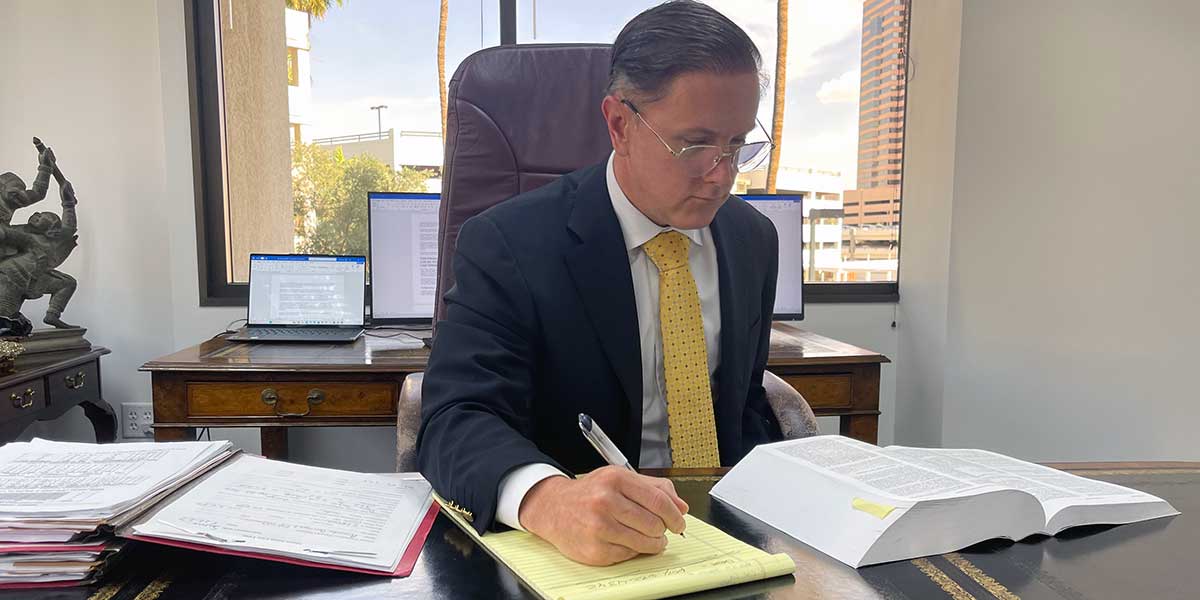In the digital age, the disclosure of explicit images, often referred to as "revenge porn," has become a complex legal issue in Arizona.
This situation arises when someone shares explicit images or videos of another person, typically using an electronic device, without the depicted person’s consent. Arizona law under ARS § 13-1425 addresses this issue by recognizing the rights of individuals who have a reasonable expectation of privacy.
The law covers various methods of disclosure, including social media, text messages, and websites.
ⓘ This article will cover the following topics:
- What Does the Unlawful Disclosure of Explicit Images Mean Under Arizona Law ( ARS 13-1425 )
- In What Ways Can Revenge Porn Happen?
- What are the Potential Penalties For Revenge Porn in Arizona?
- FAQ: Understanding Arizona's Unlawful Disclosure of Explicit Images Law (ARS 13-1425)
- How to Defend Against Unlawful Disclosure of Explicit Images Charges
- Contact a Criminal Defense Attorney From Kolsrud Law Offices
At Kolsrud Law Offices, we are dedicated to providing thoughtful and effective defense strategies for those facing accusations related to the disclosure of explicit images. Our experienced legal team understands the nuances of these cases and is committed to ensuring that your rights are protected throughout the legal process.
Contact us today to schedule a free consultation and learn more about how we can help you.

What Does the Unlawful Disclosure of Explicit Images Mean Under Arizona Law ( ARS 13-1425 )
Under ARS § 13-1425, the unlawful disclosure of explicit images occurs when a person intentionally shares an image of another person who is identifiable either from the image itself or from information connected with the image.
This law applies when the following conditions are met:
- Depiction of Nudity or Sexual Activities: The image must depict the person in a state of nudity or engaged in specific sexual activities. This includes any visual representation, such as a photograph, videotape, film, or digital recording.
- Reasonable Expectation of Privacy: The depicted person must have a reasonable expectation of privacy. Simply sending an image to another person via an electronic device does not eliminate this expectation. The law recognizes that individuals often share such images in the context of a private relationship and does not consider this action alone as a waiver of privacy rights.
- Intent to Harm, Harass, Intimidate, or Coerce: The image must be disclosed with the intent to cause harm, harass, intimidate, threaten, or coerce the depicted person. Harm under this statute can include physical injury, financial injury, or serious emotional distress.
The law specifically excludes certain activities from being considered unlawful disclosure, including the reporting of unlawful conduct, lawful practices of law enforcement, legal proceedings, and medical treatment, as well as images involving voluntary exposure in public or commercial settings.
Additionally, the law does not apply if the disclosure is made with the consent of the person depicted in the image.
Violation of ARS § 13-1425 is generally classified as a Class 5 felony. However, if the image is disclosed by electronic means—such as email, mobile device, or website—the offense may be elevated to a Class 4 felony.
Additionally, threatening to disclose an image without actually doing so may result in a Class 1 misdemeanor charge.
In this context, "disclose" refers to the act of displaying, distributing, publishing, advertising, or offering the image. The statute aims to protect individuals from the non-consensual sharing of private, explicit images.

In What Ways Can Revenge Porn Happen?
Revenge porn can occur in various ways, reflecting the diverse methods through which explicit images can be shared and distributed in today's interconnected world:
- Social Media Posts: Sharing explicit images on platforms like Facebook, Instagram, Twitter, or Snapchat without the person’s consent.
- Text Messages or Emails: Sending explicit photos or videos via SMS, MMS, or email to third parties without permission.
- Online Forums or Websites: Uploading explicit content to websites, forums, or other online platforms where it can be accessed by the public.
- Sharing via Cloud Storage: Distributing explicit images through cloud storage services such as Google Drive or Dropbox, making them accessible to others.
- Direct Messaging Applications: Using apps like WhatsApp, Signal, or Telegram to share explicit content without consent.
Each of these actions can lead to severe legal consequences under Arizona law, particularly when the intent is to harass or embarrass the person depicted.

What are the Potential Penalties For Revenge Porn in Arizona?
The penalties for the unlawful disclosure of explicit images, commonly referred to as "revenge porn," are severe under Arizona law. ARS § 13-1425 outlines specific penalties based on the nature of the offense, reflecting the serious impact this crime can have on the victims involved.
- Class 5 Felony: In most cases, a conviction for the unlawful disclosure of explicit images is classified as a Class 5 felony. This charge carries a potential prison sentence ranging from six months to two and a half years. In addition to imprisonment, individuals convicted may face fines of up to $150,000, probation, and a permanent criminal record, which can affect future employment, housing, and other aspects of life.
- Class 4 Felony: If the explicit images are disclosed by electronic means—such as through email, text message, social media, or websites—the offense may be elevated to a Class 4 felony. A conviction under this classification can result in a prison sentence ranging from one to three and three-quarters years. The increased severity of the charge reflects the broader and potentially more damaging reach of electronic distribution.
- Class 1 Misdemeanor: If an individual threatens to disclose an explicit image but does not actually do so, the offense may be charged as a Class 1 misdemeanor. Although this is a lesser charge than a felony, it still carries significant consequences, including up to six months in jail, fines, and potential probation.
- Restitution: In addition to these criminal penalties, the court may order the defendant to pay restitution to the victim. Restitution is intended to compensate the victim for any financial losses or emotional distress caused by the unlawful disclosure. This can include costs associated with therapy, lost wages, and other damages resulting from the crime.
The potential penalties for revenge porn in Arizona underscore the seriousness with which the state treats these offenses. A conviction can have life-altering consequences, making it imperative for anyone facing such charges to seek experienced legal representation.
| Classification | Penalties |
|---|---|
| Class 5 Felony | Prison sentence of six months to 2.5 years, fines up to $150,000, probation, and a permanent criminal record. |
| Class 4 Felony | Prison sentence of one year to three and three-quarters years for electronic distribution of explicit images. |
| Class 1 Misdemeanor | Up to six months in jail, fines, and potential probation for threatening to disclose without actual disclosure. |
| Restitution | Court-ordered compensation for financial losses and emotional distress, including therapy costs and lost wages. |
FAQ: Understanding Arizona's Unlawful Disclosure of Explicit Images Law (ARS 13-1425)
What is the "revenge porn" law in Arizona?
- The "revenge porn" law in Arizona, as outlined in ARS 13-1425, makes it unlawful for a person to intentionally disclose an image or video of another person who is identifiable and depicted in a state of nudity or engaged in sexual activities without their consent. This law aims to protect individuals from having their private, explicit images shared without their permission.
What does it mean to "intentionally disclose an image"?
To "intentionally disclose an image" means that a person deliberately shares, distributes, or displays explicit images or videos of another person, knowing that the person in the image did not consent to its disclosure. This can happen through various methods, including electronic means like emails, social media, or websites.
When is it unlawful for a person to disclose an image of another?
It is unlawful for a person to disclose an image of another if the person in the image is depicted in a state of nudity or engaging in sexual activities, and the depicted person has a reasonable expectation of privacy. The unlawful disclosure must be done with the intent to harm, harass, intimidate, or coerce the depicted person.
What constitutes "disclosed by electronic means"?
"Disclosed by electronic means" refers to the sharing of explicit images through digital platforms such as emails, text messages, social media, or websites.
What does "reasonable expectation of privacy" mean in this context?
A "reasonable expectation of privacy" means that the person depicted in the image has an actual expectation of privacy that is deemed reasonable. For example, even if someone sends an explicit image to another person using an electronic device, it does not necessarily remove their expectation of privacy for that image.
Are there any exceptions where it is not unlawful for a person to disclose explicit images?
Yes, there are exceptions under ARS 13-1425. It is not unlawful for a person to disclose explicit images if the exposure occurs in a public or commercial setting, if the image is shared during lawful practices such as law enforcement or medical treatment, or if the disclosure is made with the consent of the depicted person.
What penalties can someone face under Arizona's revenge porn law?
Penalties for violating ARS 13-1425 can range from a Class 5 felony, with potential imprisonment of six months to two and a half years, to a Class 4 felony if the image was disclosed by electronic means, carrying a sentence of up to three years and nine months. Restitution and fines may also apply, especially if the depicted person has suffered emotional or financial harm.
How does a criminal history impact the charges under Arizona's revenge porn law?
A prior criminal history can lead to more severe penalties under Arizona’s revenge porn law. For example, a person with previous convictions may face heightened charges and longer sentences. It is crucial to consult with a defense lawyer to understand how your criminal history may affect your case.
Can I be charged if I only threatened to disclose an image but didn't actually do it?
Yes, under ARS 13-1425, threatening to disclose an image without actually doing so can result in a Class 1 misdemeanor charge. Even without the actual disclosure, the threat alone can lead to legal consequences.

How to Defend Against Unlawful Disclosure of Explicit Images Charges
Facing charges under ARS § 13-1425 for the unlawful disclosure of explicit images is a serious matter in the state of Arizona.
However, with the right legal strategy, there are several defenses that a skilled defense lawyer from our firm can explore. These defenses often revolve around challenging the intent behind the disclosure, the extent of harm caused, and whether the depicted person had a reasonable expectation of privacy.
Here are some common defenses in an Arizona revenge porn case:
1. Lack of Intent to Harm
Under Arizona law, the prosecution must prove that the accused had the intent to harm, harass, intimidate, or coerce the depicted person. If the defense can establish that the dissemination of explicit images was not done with malicious intent, this could lead to a reduction or dismissal of charges. For example, if the image was shared accidentally or without the intent to cause harm, the intent behind the disclosure may not meet the legal threshold for a crime.
2. Consent of the Depicted Person
Another defense involves showing that the depicted person consented to the disclosure of the image. Arizona law treats the lack of consent as a key element in these cases. If it can be demonstrated that the person in the image gave permission for its disclosure, whether on a website or through an electronic device, this could negate the charges. Evidence such as messages or agreements that show consent may be vital in building this defense.
3. Reasonable Expectation of Privacy
The law makes it a crime to disclose explicit images if the depicted person had a reasonable expectation of privacy. However, if the defense can argue that the person did not exhibit an actual expectation of privacy, particularly in cases involving exposure in a public setting, this may weaken the prosecution’s case. For instance, images taken in public venues where privacy could not be reasonably expected might not satisfy the legal requirements for this charge.
4. Challenging the Evidence
In any criminal case, the evidence must be closely scrutinized. A defense lawyer may challenge the validity of the evidence, such as questioning how the image was obtained, whether it was altered, or if there were issues with the chain of custody. If the evidence includes disclosure on a website or through other electronic means, the defense may argue that the connection with the image is not strong enough to prove the defendant's involvement.
5. Mistaken Identity
In cases where there is uncertainty about who disclosed the image, the defense may focus on mistaken identity. If the person accused was not the one who electronically disclosed the image, this could be a strong defense. Presenting alibis, digital forensics, or other evidence that challenges the connection with the image can be pivotal in these cases.
6. First Amendment Defense
Though less common, a First Amendment defense might be applicable in certain circumstances, particularly if the dissemination of explicit images occurred in a context that could be considered protected speech. This defense would need to be carefully evaluated based on the specifics of the case.

Contact a Criminal Defense Attorney From Kolsrud Law Offices
If you are facing charges related to the unlawful disclosure of explicit images, it’s important to have a knowledgeable and experienced defense attorney by your side.
At Kolsrud Law Offices, we offer the expertise needed to navigate these complex cases. Led by Josh Kolsrud, a seasoned attorney with extensive experience in handling felony cases, our firm is dedicated to providing personalized and effective defense strategies.
Josh’s background, including his work at the Maricopa County Attorney’s Office and his handling of over 3,500 cases and 100 jury trials, equips him with the insight and skill necessary to protect your rights.
Contact us a call immediately at (480) 680-9769 so we can get started right away at building a solid defense strategy.
Contact us today to schedule
A FREE CONSULTANT and learn more
about how we can help you.
An award-winning criminal defense attorney Since 2006
Why Choose Josh Kolsrud
With over 100 jury trials to his name, and years of experience as a state and federal prosecutor, Josh understands the law, the legal process, and your rights. Josh is also committed to representing every client with utmost integrity and dedication
Experience
Josh has prosecuted major crimes on the state and federal level, led a successful anti-human sex trafficking operation that saved lives, and argued before countless juries and justices for his clients
Expertise
Josh is an expert in both Arizona and federal criminal law, and is ready to put that expertise to work for you.
Dedication
As a prosecutor, Josh saw far too many defendants lose their livelihood due to poor representation. Josh will always give every client his complete attention and effort
Get a Free Initial Consultation:
Please complete our form below to get a free initial consultation
or call us at (480) 999-9444.
